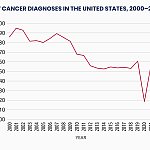
Intensive blood pressure control for adults with hypertension (high blood pressure) and high cardiovascular risk can reduce the risk of mild cognitive impairment or dementia in the long term, according to a new study by researchers at Wake Forest University School of Medicine.
This is in the context in which more than 9 million Americans could develop dementia by 2030, and nearly 12 million by 2040.
The recent study, published in Neurology, aimed to examine the effects on cognitive decline from standard and intensive blood pressure treatment.
Researchers used data from the landmark
The findings suggested that lowering systolic blood pressure would reduce the risk of dementia, but the SPRINT study’s success in lowering cardiovascular disease meant that it was stopped early, so ultimate results regarding dementia were inconclusive.
The new study’s authors aimed to sustain the process of intensive blood pressure treatment for more conclusive results.
SPRINT’s researchers incorporated 9,361 patients over the age of 50 in the United States and Puerto Rico, who were randomly assigned to a systolic blood pressure goal of either less than 120 millimeters of mercury (mm Hg), which amounted to an intensive treatment, or less than 140 mm Hg (standard treatment) between 2010 and 2013.
The patients received 3.3 years of treatment and were followed up with until 2018.
The new study’s researchers determined the cognitive status of 4,232 (59%) participants (mean age 67 years, 36% female).
During the years of follow-up, 248 of those who had undergone intensive blood pressure treatment were determined to have probable dementia or mild cognitive impairment, compared with 293 participants who had received standard treatment.
The findings confirmed that an intensive treatment of hypertension was associated with a significantly lower risk of mild cognitive decline.
“Over a median of almost 7 years of follow-up, we observed that the previously reported statistically significant reduction in the rate of cognitive impairment (composite of [mild cognitive decline] or probable dementia) was maintained,” the researchers write in their study paper.
“The estimated effect on probable dementia, although not statistically significant, was also similar to the primary trial analysis in showing a lower incidence of probable dementia associated with intensive treatment,” they further note.
American Heart Association data indicate that
Research published in 2022 showed that the longer a person’s blood pressure remains under control, the lower their risk for cognitive decline or dementia.
José Morales, MD, a vascular neurologist and neurointerventional surgeon at Providence Saint John’s Health Center in Santa Monica, CA, who was not involved in the study, told Medical News Today that, left unchecked, high blood pressure can leave damage beyond cardiovascular impairments:
“Elevated blood pressure leads to end-organ damage in the brain. While it is more commonly associated with stroke, its insidious effects are cognitive impairment. There are likely subclinical changes that are undetectable or unnoticeable due to cognitive reserve, but the degree or extent of brain damage that results in cognitive impairment is most likely many years in the making and insidiously progressing.”
The study focused on treatment involving medication rather than any lifestyle changes. Doctors will often recommend a low dose of medication at first, but people with hypertension may need to combine
Medications for hypertension include:
“Lifestyle and dietary changes are definitely first line approaches, but when these fail to adequately control hypertension medication becomes necessary,” said Morales.
“It really depends patient to patient. Some patients are young and have poorly controlled blood pressure, which is likely causing subclinical damage that increases their later life risk of dementia. In general, the average person with hypertension is middle-aged and studies now implicate this age bracket with significant changes in our body that are a harbinger for future health,” he explained.
Cheng-Han Chen, MD, a board-certified interventional cardiologist and medical director of the Structural Heart Program at MemorialCare Saddleback Medical Center in Laguna Hills, CA, who also was not involved in the study, told MNT that high blood pressure, if left unchecked, does damage to cognition over years, regardless of age.
However, adults in middle age generally are the most at risk if their blood pressure is beyond normal range.
“There is a not a single age at which high blood pressure permanently leads to cognitive decline. Rather, the negative effects of high blood pressure likely occur over a period of decades,” Chen said.
“Some studies point to ‘midlife‘ (age 40’s to early 60’s) as the period of life during which much of the damage occurs,” he noted, which emphasizes the importance of managing blood pressure as we age.





